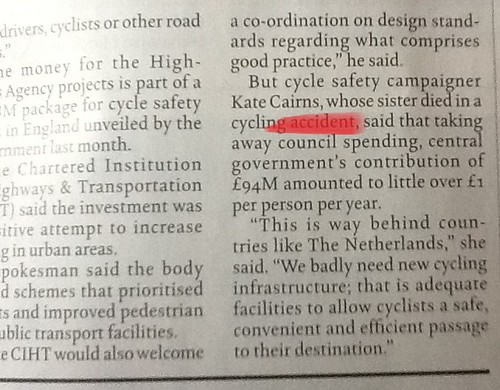 |
| From nce magazine, 5 September 2013 |
One paragraph of the article reads like this
"But cycle safety campaigner Kate Cairns, whose sister died in a cycling accident, said that taking away council spending, central government's contribution of £94M amounted tlittle over £1 per person per year."
I completely agree with Kate Cairns words that follow, and her general line of argument and sentiment. What I do not agree with is the way the reporter makes assumptions. Eilidh Cairns' death was not an "accident" as the reporter quite insensitively puts it. Eilidh Cairns was a victim of a horrific road crash.
Using the word accident implies that a certain randomness took place that day, which then wrongly attributes blame. Instead, what happened was avoidable. It's a failure of our society that the driver was allowed back on the road, and so his second killing, a pedestrian, weighs heavily on our common conscience.
Justice was suspended on both those tragic days.
The truth is that what happens on our roads is rarely accidental. The majority of crashes are through driver error or fault. We then let cyclists and pedestrians, or their families on heir behalf, carry the large chunk of societal blame, afterwards, through the police and court system. That has to stop. One aspect you could help with is that reporting must be proportionate and fair.
Not a civil engineer's problem? Think again.
If any THING was to blame, it is the infrastructure, which is typically inadequate for, and counterproductive to, safe cycling. And engineers can help fix that. I entirely agree with Kate Cairns of SeeMeSaveMe calling for more space to be set aside, and with urgency. And it is what the recent House of Commons entitled 'Get Britain Cycling' resolved to do. I wonder whether the ice will see fit to join this movement towards fair protected cycle space separated from vehicles to enable a "cycle revolution" (to only use the latest buzz phrase) to take place, discuss this urgent matter with Norman Baker MP, and to report back to their members about the outcome? Whilst not perfect, but elevating LTN2/08 from guidance to standard status would be a start.
There are problems. But there are solutions too. Some big, some small. Words count.
As Roadpeace state "We urge the media, the police, the emergency services, health professionals and all others to adopt a neutral, constructive terminology when referring to collisions on the roads such as crash, collision or incident." Read this for further information http://www.roadpeace.org/
Please forward this to any journalists you may know.
One small point is that NCE is not the voice of the ICE (and therefore not representing ICE members).
ReplyDeleteNCE used to be owned by the ICE, but was sold off in 1995 to EMAP (along with the editorial control). While it is generally a good read, I have occasionally been irritated in the way there is a hint that those giving opinion and editorial are some way representing ICE and its membership.
As a highways person, I am increasingly more interested in CIHT's Transport Professional as while it is published externally, it is a CIHT publication.
This is a shame as I am chartered through the ICEm but find CIHT increasingly more relevant to me!
Cyclists don't like the word accident because they like to blame others for their own poor road manners when something goes wrong. And of course where there's blame there's a claim..
ReplyDeleteThere should be a new highway code rules invented just for cyclists. They would read:
Cyclists: If you choose to ride on the road, then you do so at your own risk.
Cyclists: Do not ride in a manner that annoys other road users, keep well over to the left and do not burden or hamper motor traffic.
Cyclists: Remember drivers subsidise your free cycling. Please show respect by giving way at all times.
Billy Butler - how can I put this succinctly? You're an idiot. That should just about cover that.
ReplyDeleteKats wrote "Eilidh Cairns' death was not an "accident" as the reporter quite insensitively puts it. Eilidh Cairns was a victim of a horrific road crash. " If you are saying that this incident, and I don't know the circumstances, wasn't an "accident", something that had a degree of randomness to it, then the implication is that this was a deliberate act. To use the term "accident" does not wrongly attribute blame but leaves space for blame to be attributed when the facts surrounding an "accident" have been determined. Immediately assuming that the rider of a bicycle was not at fault is as wrong as assuming they were. To say "The truth is that what happens on our roads is rarely accidental. The majority of crashes are through driver error or fault" adds nothing to the debate. Humans are fallible, that's an inescapable fact. To appoint blame for fallibility and tinkering with semantics will not advance the cause you espouse one inch.
This comment has been removed by the author.
ReplyDelete